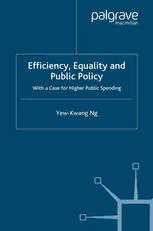
Efficiency, Equality and Public Policy: With a Case for Higher Public Spending PDF
Preview Efficiency, Equality and Public Policy: With a Case for Higher Public Spending
Efficiency, Equality and Public Policy Also by Yew-Kwang Ng INCREASING RETURNS AND ECONOMIC ANALYSIS (editor with K. Arrow and X. Yang) MESOECONOMICS: A MICRO–MACRO ANALYSIS SOCIAL WELFARE AND ECONOMIC POLICY SPECIALIZATION AND ECONOMIC ORGANIZATION (with X. Yang) WELFARE ECONOMICS Efficiency, Equality and Public Policy With a Case for Higher Public Spending Yew-Kwang Ng Professor of Economics Monash University Victoria Australia First published in Great Britain 2000 by MACMILLAN PRESS LTD Houndmills, Basingstoke, Hampshire RG21 6XS and London Companies and representatives throughout the world Acatalogue record for this book is available from the British Library. ISBN 978-1-349-39897-3 ISBN 978-0-333-99277-7 (eBook) DOI 10.1057/9780333992777 First published in the United States of America 2000 by ST. MARTIN’S PRESS, INC., Scholarly and Reference Division, 175 Fifth Avenue, New York, N.Y. 10010 ISBN 978-0-312-23208-5 Library of Congress Cataloging-in-Publication Data Ng, Yew-Kwang. Efficiency, equality and public policy : with a case for higher public spending / Yew-Kwang Ng. p. cm. Includes bibliographical references and index. ISBN 978-0-312-23208-5 1. Policy sciences. 2. Economic policy. 3. Expenditures, Public—Decision mak- ing. I. Title. H97 .N5 2000 338.9—dc21 99–056733 ©Yew-Kwang Ng 2000 Softcover reprint of the hardcover 1st edition 2000 978-0-333-67165-8 All rights reserved. No reproduction, copy or transmission of this publication may be made without written permission. No paragraph of this publication may be reproduced, copied or transmitted save with written permission or in accordance with the provisions of the Copyright, Designs and Patents Act 1988, or under the terms of any licence permitting limited copying issued by the Copyright Licensing Agency, 90 Tottenham Court Road, London W1P0LP. Any person who does any unauthorised act in relation to this publication may be liable to criminal prosecution and civil claims for damages. The author has asserted his right to be identified as the author of this work in accordance with the Copyright, Designs and Patents Act 1988. This book is printed on paper suitable for recycling and made from fully managed and sustained forest sources. 10 9 8 7 6 5 4 3 2 1 09 08 07 06 05 04 03 02 01 00 To Siang, Aline, Eve, and Tess This page intentionally left blank Contents Preface x 1 Introduction 1 1.1 A dollar is a dollar: a simple solution to the big efficiency–equality tradeoff 1 1.2 A partial resurrection of the old ‘new welfare economics’? 1 1.3 Introductory summary 2 1.4 A case for higher public spending 4 1.5 The misguided consensus 5 1.6 Three basic problems of social choice/public policy 7 1.7 Some specific points made 9 1.8 A methodological note 9 1.9 What this book is not about 10 Part I The Foundation of Public Economic Policy 13 2 The Necessity of Interpersonal Cardinal Utility 15 2.1 An intuitive explanation using a parent’s choice 15 2.2 Economists’ misplaced hostility against cardinal utility 17 2.3 The impossibility of social choice based on ordinal utilities 21 3 Welfarism 24 3.1 The Sen–Ng debate on welfarism: an appraisal 24 3.2 Another argument for welfarism 30 3.3 Rational individualism implies welfarism 32 4 Utility, Informed Preference, or Happiness 36 4.1 Non-affective altruism: the pure concern for the welfare of others 37 4.2 Irrational preferences 45 4.3 Autonomous desires 52 4.4 Why is happiness fundamental? 54 5 Utilitarianism 57 5.1 Compelling arguments for utilitarianism 57 vii viii Contents 5.2 Rational individualistic egalitarianism implies utilitarianism 62 5.3 A defence of Harsanyi against some recent criticisms 66 5.4 A defence of using just perceptible increments 72 5.5 Utilitarianism and process fairness 76 6 A Dollar is a Dollar: Solution to the Paradox of Interpersonal Cardinal Utility 82 6.1 The paradox of interpersonal cardinal utility 82 6.2 The proposed solution 83 6.3 Economists should be in favour of reversed weighting! 90 6.4 Some qualifications 92 6.5 Concluding remarks 97 7 Economics versus Politics 99 Part II How Much Should the Government Spend? 103 8 A Case for Higher Public Spending 105 8.1 Some simple theories of government spending 105 8.2 Inefficiency in public spending may increase its optimal level 108 8.3 General taxation may be more corrective than distortive 111 8.4 Diamond effects and burden-free taxes 111 8.5 Relative-income effects bias against public expenditure 113 8.6 The unimportance of absolute income 115 8.7 Welfare-improving public expenditures 119 8.8 Concluding remarks 120 9 The Appropriate Benefit–Cost Ratio for Public Spending 124 9.1 The conventional view 124 9.2 Kaplow’s argument and the principle of ‘a dollar is a dollar’ 126 9.3 Reconciling Kaplow and Feldstein 130 9.4 Concluding remarks 134 10 Concluding Remarks 135 Appendix A Electrical Brain Stimulation: a Case Showing the Importance of Public Spending in Research 137 A1. Misconceptions on the costs of public spending 137 A2. Direct access to intense pleasure 137 Contents ix A3. Enormous benefits 138 A4. Safe and long-lasting pleasure 138 Appendix B Pure Egalitarianism: a Critique 141 B1. Why is happiness the only ultimate consideration? 141 B2. Equality in the welfare weights 143 B3. The libertarians 143 B4. Rawls 144 B5. Pure and welfare egalitarianism 145 B6. Sen and capability egalitarianism 148 B7. Concluding remark 150 Appendix C Economic Growth Increases the Optimal Share of the Public Sector 151 Appendix D Non-Affective Altruism: When the Pareto Principle is Unacceptable 158 D1. The Pareto principle 158 D2. When the weak Pareto principle is unaccceptable 159 D3. The case of affective altruism 161 D4. Should voters be asked to suppress their non-affective altruism? 162 Appendix E The Bergson–Samuelson Tradition Implies Individualism, Independence, and Ordinalism 163 Appendix F Inefficiency in Provision May Increase Optimal Public Spending 164 Notes 165 References 169 Name Index 184 Subject Index 188
